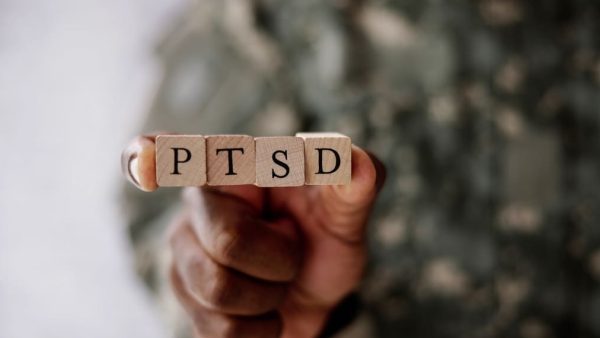Looking for Expert-Level VA Claim Answers?📱Call Us Now! 737-295-2226
When you think of post-traumatic stress disorder (PTSD), you may think of flashbacks, unsettling memories, or negative thoughts. But did you know that there are some easily missed signs of PTSD, making it harder to diagnose?
What makes a diagnosis even harder is there is no specific test for PTSD. You can’t swab your mouth to get a diagnosis. No blood test can determine evidence of PTSD.
So, understanding missed or hidden signs is essential in determining whether you may have PTSD.
It’s important to understand that resources are available. To confidentially connect with a Veterans Crisis Line responder anytime, day or night:
It’s also best to schedule an appointment with your doctor to help identify your needs.
Now, let’s look at seven missed symptoms of PTSD.
Table of Contents

7 Commonly Missed Signs of PTSD
- Memory Problems
- Persistent Feelings of Guilt and Shame
- Exaggerated Startle Response
- Avoidance of Specific Places or Activities
- Difficulty Maintaining Close Relationships / Withdrawl
- Inability to Experience Joy
- Physical Symptoms
1. Memory Problems
PTSD can affect your memory in several ways. For example, you may experience gaps in memory surrounding the traumatic event or have difficulty concentrating or forming new memories due to intrusive thoughts or flashbacks.
In addition, veterans with PTSD might struggle with short-term memory, such as forgetting appointments, losing track of personal items, or having difficulty concentrating on tasks.

2. Persistent Feelings of Guilt and Shame
If you have intense feelings of guilt or shame, especially if they seem out of proportion to the situation, they may be misinterpreted as low self-esteem or depression when it could be PTSD.
For example, if you were in an accident, you may blame yourself for what happened. Guilt can be debilitating and significantly affect your quality of life.
3. Exaggerated Startle Response
If you’ve ever found yourself jumping at sudden noises or flinching when someone comes into the room, you likely have an exaggerated startle response.
Unfortunately, these types of responses can lead to unnecessary anxiety and stress. For example, a person with PTSD may constantly scan their environment for danger, even in situations without any.
4. Avoidance of Specific Places or Activities
You may develop avoidance behaviors, including avoiding places or activities that remind you of the trauma. However, these can be subtle and not immediately linked to the traumatic event you experienced.
5. Difficulty Maintaining Close Relationships / Withdrawl
Research shows that symptoms of numbing and withdrawal are the most difficult symptoms to identify, particularly for spouses. You may notice you feel detached or emotionally unavailable, which is often mistaken for depression or lack of interest.

6. Inability to Experience Joy
Frequently, someone with PTSD may have the inability to experience joy, even with their favorite hobbies or spending time with loved ones.
You may also have increased irritability or unexpected anger outbursts that you attribute to stress.
7. Physical Symptoms
Chronic pain, headaches, stomach issues, or other unexplained physical symptoms can be linked to stress or physical health conditions rather than PTSD.
It’s vital to address aches and pains because treatment can help decrease the severity of your physical symptoms. So, don’t ignore unexplained pain because it could be a sign of PTSD.

Can You Be Living with PTSD and Not Know It?
The short answer is yes.
Examples of how you may be living with PTSD and not know it are:
You Didn’t Experience Combat
You don’t have to be on the front lines to experience PTSD. You can have PTSD without going to war.
Any traumatic event is considered a stressor, and that includes losing a fellow service member to suicide, being in a car accident, or being sexually or physically assaulted.
You Don’t Want to be Perceived as “Weak” (You’re Not!)
The stigma surrounding mental health conditions is illogical and unproductive and could keep you from recognizing and getting help for your PTSD. You are not weak if you have PTSD.
Acknowledging that something is going on is a sign of strength.
You Didn’t Have Symptoms After the Traumatic Event
While many people develop PTSD symptoms within three months of the stressor, others may not develop them for years. For example, one study showed that some World War II veterans did not manifest PTSD for 30 years after their combat trauma.
You Can’t Identify a Stressor
You might find yourself experiencing all kinds of symptoms but unable to put your finger on exactly what’s going on. PTSD shares symptoms with depression, social anxiety, and OCD; however, PTSD is a distinct diagnosis that develops in reaction to a traumatic event or stressor.

You’re Masking the Symptoms
It’s very common for people with PTSD to cope by drinking. For example, men with PTSD are two times more likely to abuse alcohol.
Conclusion
It can be tricky to diagnose PTSD because the symptoms aren’t always obvious. If you feel you may have PTSD, it’s essential to contact your healthcare provider, who can help guide you on the path to the support and treatment you deserve.
Never forget how much you matter.



